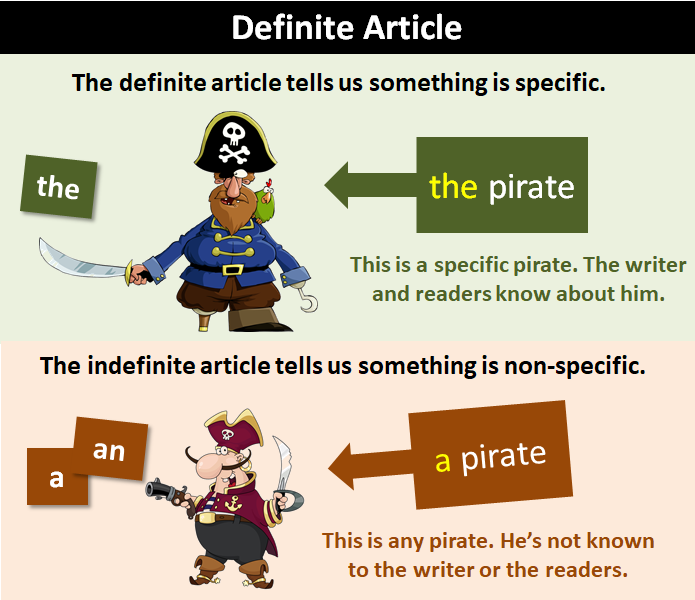Definite Article Examples in Sentence
Definite Article
Search...
What Is the Definite Article? (with Examples)
The definite article is the word "the." It is used before a noun to define it as something specific (e.g., something previously mentioned or known, something unique, or something being identified by the speaker).- I'm the pirate. (This means a specific pirate, i.e., the one previously discussed.)
- Can we go to the park? (The park is specific. It is known to the speaker and the listener.)
- I'm a pirate. (This means an unspecified pirate, i.e., not one previously discussed.)
- Can we go to a park? (The park is unspecific. The speaker doesn't care which one.)

![]() Got it? Take a quick test.
Got it? Take a quick test.
More about the Definite Article
Articles are classified as determiners. A determiner sits before a noun to indicate quantity, possession, specificity, or definiteness.There are just two types of article in English:
- The Definite Article ("the")
- The Indefinite Article ("a" and "an").
- I have found a solution to the problem. (The solution is not yet known by the listener. The problem is known to the speaker and the listener.)
A Video Summary
Here is a video summarizing this lesson on the definite article.
Why Should I Care about Definite Articles?
There are two commonly discussed issues related to definite articles.(Issue 1) Writing a job title or an office name with a capital letter.
A job title (e.g., "president," "judge," "director") or the name of office ("parliament," "court," "accounts section") is given a capital letter when it refers to a specific person or office (i.e., when it's a proper noun). So, when the definite article (i.e., "the") appears before such a title or name, there's a pretty good chance you'll need a capital letter.Here's the guidance: If the job title or office name is being used for its dictionary definition (i.e., as a common noun), then don't use a capital letter. However, if the job title or office name nails it down to one specific person or office (i.e., it is used as a proper noun), then use a capital letter.
(Issue 2) Capitalizing the "The" that starts a name (e.g., The Beatles).
Some names (particularly band names) start with "The" (e.g., "The Beatles," "The Rolling Stones," "The Sex Pistols"). When such names appear in running text, you have a choice whether to write "The" (with a capital letter) or "the." As there is no consensus among the leading style guides on this point, you can go with your preference. Remember that we are talking about a name in running text. In a formal list of names or a reference, you'd have to use "The."It is useful to think of an opening "The" as being only loosely bound to its name because there will be times when you ought to drop it.
- Did you download the Bastille album? (The group is called "Bastille.")
- Did you download the The Clash album? (The group is called "The Clash." Logically, this would be correct, but no one would write or say it because it's far too unwieldy.)
- Did you download the Clash album? (This is the most acceptable version, but we've lost the "The.")
- Gina Vitale: It's called "The La Trattoria".
Michael Felgate: "The La Trattoria" means The The Trattoria.
Gina Vitale: I know. (An extract from the 1999 Hugh Grant film Mickey Blue Eyes)
- Does it disturb anyone else that "The Los Angeles Angels" baseball team translates directly as "The The Angels Angels"? (Unknown)
Key Points
- A job title (e.g., "President") or an office name (e.g., "Parliament") is written with a capital letter when it specifies a unique person or office (i.e., is not just the dictionary definition of that word). When such a name does specifically refer to a unique person or office, it will very likely be preceded by "the."
- When a name starts with "The" (e.g., "The Who"), you can write "the Who" or "The Who" as you think looks best (when it's in flowing text).
Ready for the Test?
Here is a confirmatory test for this lesson.
This test can also be:
- Edited (i.e., you can delete questions and play with the order of the questions).
- Printed to create a handout.
- Sent electronically to friends or students.
- Do you disagree with something on this page?
- Did you spot a typo?
See Also
Indefinite article What are adjectives? When to use an and a Glossary of grammatical termsTechnical Help
- Download the latest grammar-checker app
Grammarly's app will help with:
(1) Avoiding spelling errors
(2) Correcting grammar errors
(3) Finding better words
(This free browser extension works with webmail, social media, and texting apps as well as online forms and Microsoft Office documents, like Word and Teams.)
Self Help
- Buy a Grammar Monster book
We have two books:
(1) "Smashing Grammar"
Written by the founder of Grammar Monster, "Smashing Grammar" has an A-Z glossary of grammar terms, a punctuation section, and a chapter on easily confused words. Each entry starts with a simple explanation and some basic examples before giving real-life, entertaining examples.
Every entry ends with a summary explaining why the grammar point matters to a writer. If you like Grammar Monster, you'll love this book. [more...]
(2) "Grammar for Grown-ups"
"Grammar for Grown-ups" is an easy read. Practical rather than academic, this best seller is packed with real-life examples and great quotations from Homer the Greek to Homer the Simpson. It is a light-hearted, easily digestible grammar reference. [more...]
Free Help
Definite Article Examples in Sentence
Source: https://www.grammar-monster.com/glossary/definite_article.htm